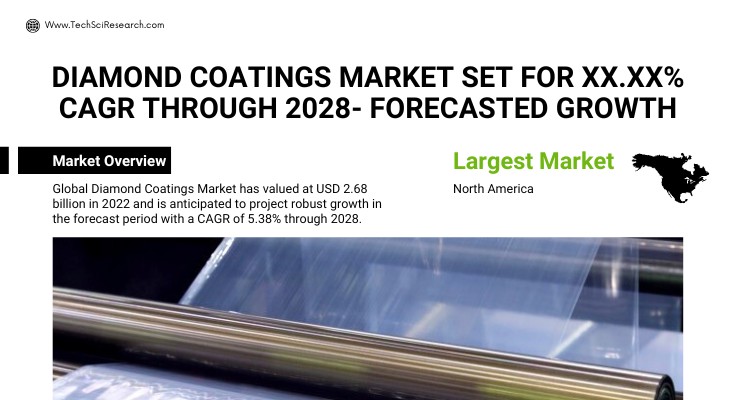According to TechSci Research report, “Diamond Coatings Market – Global Industry Size, Share, Trends, Competition Forecast & Opportunities, 2028”, the Global Diamond Coatings Market stood at USD 2.68 billion in 2022 and is anticipated to grow with a CAGR of 5.38% in the forecast period, 2023-2028. The initiatives taken by the government based on Diamond Coatings has led to favorable market conditions for the Global Diamond Coatings Market. Several factors contribute to the growth of various Diamond Coatings products.
The Federal Government of the United States has recognized the immense potential of synthetic diamond research and has made significant investments in this field. According to a report from the prestigious New York Times, the government allocates a substantial annual budget of $6 million to support cutting-edge research in synthetic diamonds. This funding is further bolstered by a generous contribution of $3.5 million from Strategic Defense, underscoring the strategic importance and national significance of this research endeavor.
In addition to the Federal Government, governments worldwide have also demonstrated their commitment to advancing the development and utilization of diamond coatings. This unwavering support has paved the way for extensive and vigorous research and development activities focused on exploring the wide range of current and potential applications of diamond coatings. Through collaboration between researchers, scientists, and industry experts, groundbreaking advancements are being made to harness the exceptional properties of diamond coatings, revolutionizing diverse sectors such as electronics, aerospace, medical, and more. The collective efforts of governments in supporting these research initiatives not only drive technological progress but also foster economic growth and global competitiveness, firmly establishing diamonds as a key material for the 21st century and beyond.
Diamond coatings offer numerous advantages that make them highly appealing for use in electronics. Firstly, diamond, renowned for its exceptional thermal conductivity, efficiently dissipates heat generated by electronic components, thereby preventing overheating and significantly enhancing device performance. This remarkable heat dissipation property ensures optimal functioning and longevity of electronic devices, even under demanding operating conditions.
Secondly, diamond coatings provide excellent electrical insulation properties, effectively isolating electronic components from potential electrical hazards. This insulation capability not only ensures the safe operation of electronic devices but also minimizes the risk of electrical malfunctions or short circuits, safeguarding both the device and the user.
Lastly, the exceptional hardness of diamond plays a crucial role in enhancing the durability of electronic components. By forming a protective layer, diamond coatings effectively shield the underlying materials from wear, corrosion, and other forms of degradation. This increased durability not only extends the lifespan of electronic devices but also improves their reliability, making them more resistant to environmental factors and ensuring consistent performance over time.
Browse over XX market data Figures spread through XX Pages and an in-depth TOC on the “Diamond Coatings Market” @ https://www.techsciresearch.com/report/diamond-coatings-market/4650.html
The Global Diamond Coatings Market is segmented into substrate, end user, regional distribution, and company. Based on its substrate, the Composite segment held the largest share in the market. The global diamond coating market on composite substrates is a widely adopted solution for extreme wear conditions in several industries, including automotive, electronics, mechanical, petrochemical, and more. Utilizing ultra-fine diamond particles, this coating enhances the lifetime of tools and equipment, reducing maintenance-related downtime by replacing high-wear parts. Moreover, the application of diamond coating to composite parts ensures the production of consistent and high-quality products over an extended period of time, further contributing to its economic viability and reliability in various end-use applications.
Based on region, the Asia Pacific segment is expected to grow during the forecast period. Due to the availability of cost-effective labor and readily accessible raw materials, the region has witnessed a substantial influx of foreign investments. This surge in investments has been a key driver in fueling the market growth in the Asia-Pacific (APAC) region. Furthermore, the strengthening economies of countries such as China, Taiwan, Indonesia, and India have acted as magnets for attracting additional investments to the region. These favorable factors have collectively contributed to the robust expansion of the APAC global diamond coatings market, making it a lucrative and promising industry.
Major companies operating in the Global Diamond Coatings Market are:
- Blue Wave Semiconductors Inc.
- De Beers Corp
- Diamond Materials GmbH
- Endura Manufacturing Company Limited
- NeoCoat SA
- OC Oerlikon Corp. AG
- Robb-Jack Corp.
- Sandvik AB
- Smiths Group PLC
- SP3 Inc.
Download Free Sample Report @ https://www.techsciresearch.com/sample-report.aspx?cid=4650
Customers can also request for 10% free customization on this report.
“Growing application of Diamond Coatings in various end-user industries are key drivers of the Diamond Coatings Market. Growth in the competitive landscape and presence of well-established companies in the market who are dedicated to enhancing their productivity of Diamond Coatings with every passing year is anticipated to register an impressive growth to the Global Diamond Coatings Market in the forecast period.,” said Mr. Karan Chechi, Research Director with TechSci Research, a research-based management consulting firm.
“Diamond Coatings Market – Global Segmented By Substrate (Metal, Ceramic, Composite, Others), By End User (Electronics, Mechanical, Industrial, Medical, Automotive, Others), By Region, By Competition Forecast & Opportunities, 2018-2028F”, has evaluated the future growth potential of Global Diamond Coatings Market and provides statistics & information on market size, structure, and future market growth. The report intends to provide cutting-edge market intelligence and help decision makers take sound investment decisions. Besides, the report also identifies and analyzes the emerging trends along with essential drivers, challenges, and opportunities in the Global Diamond Coatings Market.
You may also read:
1,4-Butanediol Market – Current Analysis and Forecast [2028]
Polyurethane Sealants (PU) Market – Competitive Landscape and Innovation
Solventless Laminating Adhesive Market [2028]- Exploring Robust Growth & Forecast
United States Amphoteric Surfactants Market – Rising Demand and Growth Trends
Acrylate Market Set for XX.XX% CAGR Through 2028- Forecasted Growth
Table of Content-Diamond Coatings Market
- Product Overview
- Product Overview
2.1. Market Definition
2.2. Scope of the Market
2.2.1. Markets Covered
2.2.2. Years Considered for Study
2.2.3. Key Market Segmentations
- Research Methodology
3.1. Objective of the Study
3.2. Baseline Methodology
3.3. Key Industry Partners
3.4. Major Association and Secondary Sources
3.5. Forecasting Methodology
3.6. Data Triangulation & Validation
3.7. Assumptions and Limitations
- Executive Summary
4.1. Overview of the Market
4.2. Overview of Key Market Segmentations
4.3. Overview of Key Market Players
4.4. Overview of Key Regions/Countries
4.5. Overview of Market Drivers, Challenges, Trends
- Global Diamond Coatings Market Outlook
5.1. Market Size & Forecast
5.1.1. By Value
5.2. Market Share & Forecast
5.2.1. By Substrate (Metal, Ceramic, Composite, Others)
5.2.2. By End User (Electronics, Mechanical, Industrial, Medical, Automotive, Others)
5.2.3. By Region
5.2.4. By Company (2022)
5.3. Market Map
5.3.1. By Substrate
5.3.2. By End User
5.3.3. By Region
- Asia Pacific Diamond Coatings Market Outlook
6.1. Market Size & Forecast
6.1.1. By Value
6.2. Market Share & Forecast
6.2.1. By Substrate
6.2.2. By End User
6.2.3. By Country


